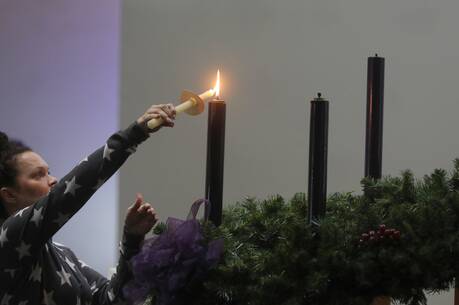Rejoicing sometimes requires a decision
“Rejoice in the Lord always,” says Paul in this Sunday’s second reading, “I shall say it again: rejoice!” (Phil 4:4). This exhortation runs throughout the letter to the Philippians. Rejoicing is also the message for Gaudete Sunday, which is the traditional name of the Third Sunday of Lent. Christmas joy is right around the corner. Each of this Sunday’s readings share the same theme. From what, however, does this joy spring? The people of God have real desires and bring heartfelt petitions to God. Their capacity to receive God’s response is the measure of the joy they experience, and this requires a decision on their part.
“The LORD, your God, is in your midst, a mighty savior… he will sing joyfully because of you, as one sings at festivals” (Zep 3:17-18).
What decision will you make, large or small, to help you rejoice this week?
How do you feel praying to God who delights in you?
How can you find delight in the seasons of Advent and Christmas?
References to fear, common in the readings of the first Sunday of Advent, are now banished. In a certain tradition, attested throughout the Bible, the initiative for the spiritual life comes from God. This is certainly the case in this Sunday’s first reading. “The Lord has removed the judgement against you,” says the prophet Zephaniah, and therefore “you have no further misfortune to fear” (Zep 3:15).
This thread also appears in the New Testament. It is especially prevalent in the writings of John the Evangelist. “We love because he first loved us” (1 Jn 4:19). This tradition also likes behind this Sunday’s GospelThe Hebrew scriptures also understand the principle but describe it differently.
God’s decision by God to dwell with Israel appears twice. “The King of Israel, the Lord, is in your midst,” and again, “The Lord, your God, is in your midst, a mighty savior” (Zep 3:15-17). Dwelling with Israel, Zephaniah believes, is a source of joy for God, who will sing with joy and delight with gladness over Israel’s renewal (Zep 3:17). God makes two decisions. The first is to dwell with humanity. The second is to rejoice over them. Part of the joy of this season is to recognize how the initiative to mature in the faith comes from God in the first place.
This Sunday, instead of a responsorial psalm, the church proclaims a hymn from the prophecy of Isaiah. In a reversal from the first reading, the initiative now comes from the people. “Give thanks to the Lord, acclaim his name! Shout with exultation, O city of Zion!” (Is 12:4-6). Again, these phrases are simple yet profound. The capacity to give thanks for anything is the fruit of spiritual reflection. Thanksgiving itself is the foundation for deep peace, as the prophet acknowledges at the beginning of the passage: “God indeed is my salvation; I am confident and unafraid” (Is 12:2). Isaiah’s hymn reveals the deep interconnectedness of gratitude, peace and confidence.
This Sunday’s Gospel begins with the crowds hoping for “good answers” to their collective question: “What should we do?” (Lk 3:10). Three different groups ask the same question of John the Baptist. One group in particular is meant to be general, the crowds, while the other two are specific groups, tax collectors and soldiers, known for their extortionist practices. Each groups receives an answer that directs them to become the best version of yourselves. John the Baptist provides concrete answers, exhorting them to make practical decisions to live out in real time. “Share your tunic with another,” says John, as well as, “Stop collecting more than necessary” (Lk 3:11-13). The crowds are thrilled with these direct and commonsense responses. Their buzz of hope comes through clearly in Luke’s account: “Now the people were filled with expectation, and all were asking in their hearts whether John might be the Christ” (Lk 3:15).
John the Baptist knows a secret. God has already taken the initiative and made a decision, and the result is unfolding before the crowds even as they pose their questions. John knows that, due to God’s initiative, another individual is coming soon. The words of Zephaniah are coming to life in the present moment: “The Lord, your God, is in your midst, a mighty savior,” and as Zephaniah foretold, the Messiah will delight to be with his people. This is the very beginning of the “good news” that Israel, and later all humanity, will hear. May we too listen, rejoice and give thanks that Emmanuel, God-with-us, shares our company in a spirit of joy.








